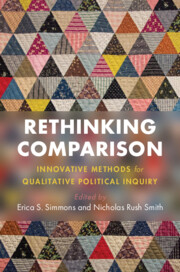Book contents
- Frontmatter
- Dedication
- Contents
- List of Figures
- List of Tables
- List of Contributors
- Acknowledgments
- 1 Rethinking Comparison: An Introduction
- Part I Rethinking the Building Blocks of Comparison
- 2 Beyond Mill: Why Cross-Case Qualitative Causal Inference Is Weak, and Why We Should Still Compare
- 3 Two Ways to Compare
- 4 Unbound Comparison
- 5 On Casing a Study versus Studying a Case
- 6 From Cases to Sites: Studying Global Processes in Comparative Politics
- Part II Developing New Approaches to Comparison through Research
- Theory and Imagination in Comparative Politics: An Interview with Lisa Wedeen
- Index
3 - Two Ways to Compare
from Part I - Rethinking the Building Blocks of Comparison
Published online by Cambridge University Press: 24 September 2021
- Frontmatter
- Dedication
- Contents
- List of Figures
- List of Tables
- List of Contributors
- Acknowledgments
- 1 Rethinking Comparison: An Introduction
- Part I Rethinking the Building Blocks of Comparison
- 2 Beyond Mill: Why Cross-Case Qualitative Causal Inference Is Weak, and Why We Should Still Compare
- 3 Two Ways to Compare
- 4 Unbound Comparison
- 5 On Casing a Study versus Studying a Case
- 6 From Cases to Sites: Studying Global Processes in Comparative Politics
- Part II Developing New Approaches to Comparison through Research
- Theory and Imagination in Comparative Politics: An Interview with Lisa Wedeen
- Index
Summary
What are the different ways in which we compare? Or to rephrase the query more precisely: What are the different ways in which we ordinarily use the word “compare”? This chapter distinguishes two ways of comparing, two uses of the word “compare,” to bring into clearer view a way of comparing that, despite being common to political science, often goes unnoticed. What are the two ways to compare? To compare juxtapositionally is to place similar kinds of things side by side to catalog their similarities and differences. To compare perspectivally is to draw an analogy between different kinds of things as a way to establish a vantage point from which to view one thing in terms of the other. Political science scholars who write about comparing usually focus their attention on comparing juxtapositinally – how to describe (and explain) patterns of similarity and difference across like kinds of things, events, processes, meanings, and so on. Yet political scientists routinely compare perspectivally as well. However, perspectival comparison has been the subject of far less methodological reflection in political science than has its juxtapositional cousin. By drawing attention to perspectival comparison, this chapter provides a set of starting points that political scientists may use to think more clearly about something that they would otherwise do unreflectively.
Keywords
- Type
- Chapter
- Information
- Rethinking ComparisonInnovative Methods for Qualitative Political Inquiry, pp. 47 - 63Publisher: Cambridge University PressPrint publication year: 2021
- 4
- Cited by

